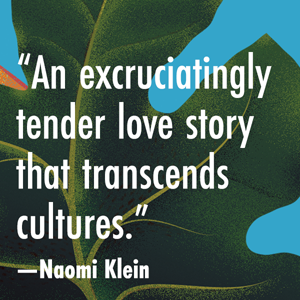


Full description not available




W**N
Indescribable -very thought provoking
This novel is very complex. It covers relationships, love grief, conflict, inter generational differences, nature and much more. I had a bit of difficulty getting into it. Briefly thought of abandoning it. But very glad that I read it. A book that I may read again.
J**I
Really really good…
I never thought I would enjoy a story of how trees view humanity with our foibles, squabbles, quarrels, wars, hatreds, loves…. But this was amazing. Part historical novel about the partition of Cyprus and the violence around that, part coming of age story in a time of grief, part nature study about trees and fauna and how intertwined they are with our culture and existence, this book was an exploration of what it means to be a survivor that bears the marks of past trauma and what it means to keep moving forward.This novel focuses on the love story of Kostas and Defne, star-crossed Greek and Turkish Cypriot lovers whose devotion to each other is tested by the violent conflict that emerges in 1974. Despite their commitment to putting the past behind them and moving forward, years later, their teen daughter Ada’s breakdown in the middle of a history class brings past traumas once again to the fore.This is my first book by this author and I’m not sure how she accomplished a book that was simultaneously heartbreaking and healing, how she managed to make the reader feel part of the story even though we were jumping timelines and perspectives between the tree, the characters, the plot versus the tree’s commentary…. It was brilliant and incredibly well-executed. I think the thing that makes this a little less than 4 stars for me is the inevitable fact that I could have done with a little more character development and a little more connective plot… I wanted more Ada, more Meryem, more Kostas… even more Defne… this was a very introspective sort of book where the characters often felt very isolated and the story mainly existed in their thoughts and reflections. For a book such as this that speaks to the interconnectedness and community of Cypriot people and more broadly of the interconnectedness of humanity and nature, the characters had little dialogue with each other and for me that would have been an opportunity to get to know them better. I recognize and the author points out (through the omniscient fig tree) that in reality unlike in fiction, we rarely know everything about characters or have the complete tale with all plot holes filled, rather we have bits and pieces of story, hints and allusions, gaps we have to fill in ourselves and information we have to content ourselves with never knowing, and this book feels very much like that. And I can accept this argument, but that left so much unsaid in the book (as it often is in life, but in a book you want to see it said- tangent: I also find it difficult to accept that Meryem came to stay in Kostas’ house and they never have a proper conversation that we can observe).That said this is so beautifully written. The proverbs and aphorisms are so apt, the reflections on human experiences of conflict, survival, migration, trauma, healing and what it means to be far from home spoke for anyone who has ever experienced the out-of-body feeling of trying to feel at home and at peace in a situation which is far from that. I found myself highlighting swathes of this book and I know it’s one I won’t forget soon. I plan to check out more books by this author.
B**S
An exceptional read
From the first page this book casts an enchantment. It is not a fantasy despite some parts told to us through the eyes of a tree. Instead it is a drama, a romance, a retelling of a terrible time on a beautiful island, a story about war, about people both young and old and a book that gives insight into cultural differences carried too far.How can it do all this? I don’t know. Maybe it is magic, magic created by an author with a lyrical bent and a desire to talk about a time on Cyprus when differences broke hearts and mayhap still do. You might also ask how can a tree have such an effect on our reader hearts and souls and again I don’t know. Perhaps that is what a true story teller is supposed to do. You can’t help but admire an author who can step aside and allow her story to be told by something that has lived and seen our human behaviour with neutrality.After all Elif Shabaka does the rest with such wonderful emotion that we realise differences are something to be revered and not used against each other.
@**L
A beautiful story of longing and wartime scars
Elif work has a nature of its own. In this beautiful, subtle book you will find an interesting essay about human nature, different personality traits and how love can overcome the worst times and survive through war and hate, yet in the end it can not scape the briefness of our time on this planet.
S**N
Nature personified
Elif Shafak is an enormously talented writer, which is well known. This novel is a love story embedded in two ecosystems: the endlessly variable underpinnings of wild nature, and the sadly unvarying ecosystem of human conflict. In this case, the physical settings are London and Nicosia, Cyprus. The humans are Greek and Turkish Cypriots. The time frame from the mid-1970s to present day. It's a worthwhile read and a worthy reminder of divided Cyprus and its denizens. I would have liked to visit the tavern with the Happy Fig.Without rehearsing the many interesting elements of the novel, I'm sure some readers will find the fig tree as narrator to be charming and valuable. I couldn't see the merit of a fig tree narrator over a human one, as the voice seems utterly human (except for some fig trivia) and obliged to convey the usual context behind the action. The fig does change the time scale and does introduce nature as an agent in human life, instead of assuming a human-centered story altogether. There's a lot of merit in that. However, the fig -- and the ants and butterflies and birds and mice, etc. -- are personified in ways that disarm the uniqueness of their voices, making them intelligible but silly. To speak of a butterfly's children or of motherhood or a queen ant's mission in life is anthropocentric to the extreme. And there's a lot of this in the novel.The Island of Missing Trees demonstrates great care and research by the author, but it often is too didactic. I felt at times like I was watching a nature documentary with a terribly serious narrator.I also found the love story tedious - a kind of clichéd romance that has appeared and reappeared forever. I liked the protagonists but not their scripts. I can't spoil the plot by saying too much about the denouement of the love story, but it seemed a little improbable. I was expecting more of a diaspora motif, but I suppose that's blaming the author for not writing the book I wanted to read.The forensic anthropology that provides a backdrop to the discovery of the novel's core mystery is powerful and rings true, not only in Cyprus but throughout the world.
Trustpilot
5 days ago
1 month ago